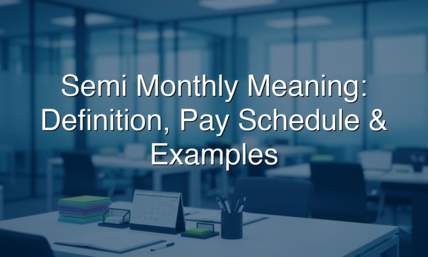The Ultimate Guide To Futa Tax
FUTA taxes are a bit of a mystery to many employers and business owners. Most are left scratching their heads when it comes to payroll and asking, 'just what is FUTA Tax and why am I paying it?' Luckily, this blog will help settle any confusion you might have and answer all your questions.
FUTA tax definition, or the Federal Unemployment Tax Act definition, is a federal law that requires employers to pay into unemployment insurance. However, many small business owners and employers are unclear on how this applies to them and what they will owe.
Who pays FUTA tax? Do I have to pay taxes for my employees? Why do I have to pay FUTA taxes even when I don't have employees? What does it mean if I'm exempt from paying FUTA taxes? These are all questions you may be asking yourself as an employer or small business owner - and here are all the answers!
Also read: Payroll Tax Vs Income Tax - The Ultimate Guide
What Is FUTA Tax?
The Federal Unemployment Tax Act (FUTA) is an act that imposes an unemployment tax, which helps to fund unemployment benefits. Let's get some history in. The act was first implemented in 1939 by Franklin D. Roosevelt after the great depression in hopes of easing poverty and hardship after many redundancies.
As a way of helping those who are involuntarily unemployed, the act ensures that individuals who qualify have a right to a temporary and partial wage replacement - this would also decrease the need for welfare. It's also commonly called the payroll tax or unemployment insurance tax since its primary purpose is to support unemployed people.
Companies are the ones that will pay towards federal unemployment insurance, and without these required tax payments, the federal government would be largely unable to fund its unemployment program.
What Is SUTA Tax?
Not to be confused with FUTA tax, SUTA tax is another form of unemployment tax. We know - it's pretty mind-boggling, but once you get the hang of it, you'll be mastering your payroll taxes in no time! SUTA tax is basically the state version of FUTA tax, helping to fund your state's unemployment insurance program.
Much like the majority of state-specific taxes, the rules and rates will vary state by state, so be sure to check what your state's rules and rates are. Like FUTA, SUTA is only paid by employers - except for three current states: Alaska, New Jersey, and Pennsylvania. These states are subject to state unemployment tax withholding, so if you have employees in any of these states, you have to withhold the tax from their wages and remit the tax to the state.
Also read: How Much Is Social Security tax?
How Do FUTA And SUTA Taxes Work And Who Pays For Them?
So, now the question of 'what is FUTA tax' has been explained, it's time to tell you how it works and who coughs up the cash. If you're an employer or run a business, then you'll most likely have employees that you pay. If you have employees, then you'll be responsible for FUTA and SUTA taxes.
This is how it works:
As an employer, you pay federal and state unemployment taxes to fund unemployment insurance payments for those that have been laid off or have lost their job through no fault of their own. The government will take this money directly from the employer to put into funding the unemployment systems.
Unlike other payroll taxes like Social Security and Medicare, FUTA tax (and most SUTA tax) are paid solely by the employer - so the rate won't be halved between employer and employee. This also means that these taxes aren't withheld from employee's paychecks.
Instead, the money is taken from the employer each quarter and given to the federal government. To submit these tax payments and keep a record of them, employers will submit all FUTA payments on IRS form 940. When you become an employer, you have to register with the state unemployment agency for an account.
The state will then send you the rate for each year, as the rates can change each year. This rate is usually based on your industry, experience, and number of unemployment claims made by your former employees.
Who Is Exempt?
While employers are the ones who pay FUTA and SUTA taxes, it's not as straightforward as it seems. Some employers are exempt from these taxes. Under ordinary situations, if your business runs payroll (which means you send your employees wages and paystubs, you'll have to pay FUTA and SUTA if you've also done the following:
-
Paid employees at least $1,500 in wages in a calendar quarter during the current or previous year.
-
Employed one or more workers for any period of time in the day during 20 or more different weeks in the current or previous year - this refers to full-time, part-time, and seasonal W-2 employees, but not independent contractors.
However, there are some extra exemptions, even for those that meet the above requirements. In general, unless your business is structured as a corporation, you won't need to pay FUTA tax. Organizations with 501(c)3 status are also exempt from FUTA tax. If you have a family-run business or choose to hire a parent, spouse, or child (under the age of 21), their wages are exempt from these taxes, too.
For businesses with household or agricultural employees, your FUTA tax obligations are slightly different, so make sure to double-check your taxes with the IRS tax guide. For SUTA tax, requirements vary by state, so it's best if you check your state's unemployment tax agency to see if you're exempt or not.
Certain businesses are exempt from both FUTA and SUTA taxes. These are:
-
Nonprofit organizations
-
Religious institutions
-
Educational institutions
Again, as state requirements vary, be sure to check your state laws first.
Also read: A Full Guide on How to Calculate Income Tax On A Pay Check
What About The Self-Employed?
So, what happens if you're self-employed? Do self-employed individuals pay FUTA tax? In a nutshell, no. As you're self-employed, you're not actually classed as an employer, so you won't need to pay any FUTA tax - however, this comes with its own set of disadvantages.
Unfortunately, since you aren't putting into the unemployment insurance that helps to fund unemployment benefits, you aren't eligible to receive unemployment benefits, either.
FUTA Tax Rates
The current FUTA tax rate is 6% on the first $7,000 of taxable wages per employee. While 6% seems high, it's only applicable on the first $7,000 you pay each employee. For example, if you have eight employees and pay them all $40,000 per year, you'll only have to pay 6% of $56,000 - this is eight lots of the $7,000 FUTA cap. So, in total, you'll only pay $3,360 in FUTA taxes.
Once an employee earns $7,000 in gross wages for the year, you'll no longer have to pay FUTA for that employee - this means that depending on the salaries you pay your staff, you could be done and dusted with your FUTA tax payments by the first quarter of the year!
SUTA Tax Rates
As mentioned above, each state will have its own rates - including a wage base and a maximum amount of wages per employee per year that you can owe SUTA tax on. Rates on SUTA tax range from as low as 0% to as high as 14.37%, so your rate depends entirely on the rules of your state.
SUTA tax is slightly more confusing than FUTA tax, as it goes off each employee's current state. You must pay state unemployment taxes to the states where your employees live, even if your business doesn't reside in the same state. For example, if your staff live in multiple states, you'll have to pay unemployment taxes to those corresponding states.
This can be tricky when trying to sort your payroll, as you'll have to work out what SUTA rates you're eligible to pay in each state your employees are in. To help you sort out all our unemployment taxes, including FUTA and SUTA tax, you can purchase payroll tax software to ease the process.
FUTA Tax Credit
There's some good news in here - most employers are eligible for FUTA tax credit if they have paid their state unemployment insurance in full and on time! FUTA tax credit can be up to 5.4%, which could see your FUTA tax rate drop from 6% to a shockingly low rate of 0.6%.
This 90% discount on your FUTA tax bill is only eligible to those that pay their tax in full and on time, so it really does pay to be diligent when remitting your state unemployment insurance. However, don't get too carried away - not everyone that's eligible will receive the full 5.4% FUTA tax credit.
This rate is the absolute most you can get, so the actual percentage you get back will depend on a few things, such as which state you do business in and whether your state has any outstanding federal unemployment insurance loans. The Department of Labor announces that states are eligible to receive the full 5.4% tax credit at the end of each year, so again, it pays to keep an eye out!
For the 2019 tax year, all 50 states were eligible for the full 5.4% tax credit. Only the US Virgin Islands weren't eligible for the full 5.4% tax credit, as they failed to repay their outstanding federal unemployment insurance loans by November 10, 2019.
Also read: How to Review Your Paychecks Before Filing Income Taxes
When And How To File And Pay FUTA Taxes
FUTA tax is calculated quarterly and can be paid annually using Form 940 or by tax deposits. If your FUTA tax has accumulated to $500 or more in any quarter during the calendar year, you are required to pay this tax via a tax deposit. If your FUTA tax doesn't total $500 or over during each of the four-yearly quarters, you'll have to fill out a form 940.
This form is where you report all your FUTA tax liabilities for the year - the annual deadline for this form is January 31. If you need help with your 940 form or tax deposits, you can hire personal accountants or invest in payroll software or a system to make the process easier.
Here's an example: If you're only liable for $30 in the first quarter, you won't have to make a tax deposit. The next quarter's tax liability will then be added to the already accumulated $30, and so on until you reach $500 or the last quarter ends. If you still haven't accumulated $500 by the end of the fourth quarter, you'll pay all your accumulated FUTA tax in one lump sum along with your Form 940.
The quarterly dates for tax deposits are:
-
January 31
-
April 30
-
July 31
-
October 31
Conclusion
FUTA (and SUTA) taxes are a part of running an organization. You need to know what they are, when to pay them, and how you can claim the credit back from the government if you're eligible. The question 'what is FUTA tax' has now been sufficiently answered, along with all the other burning questions you might have regarding unemployment taxes.
With all your questions answered and the knowledge you need to avoid losing out on helpful tax credits, it's time for you to take action. You should now have everything in place to start focusing on other aspects of running your business! You now know how the FUTA and SUTA taxes work, you're aware of what to do with them when they come up in your payroll process, and now it's time for an important discussion...
What are you going to do about these taxes? If you're still unsure whether or not to get help with your taxes or go solo, don't worry; we have plenty more information just waiting for you over at our blog page, where we discuss taxes and related subjects! In the meantime, do try out our paystub creator now.















